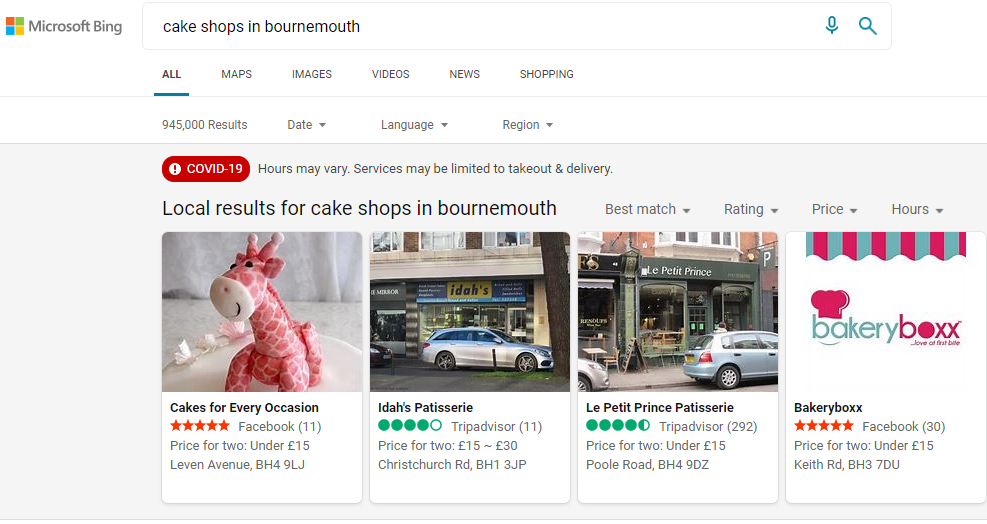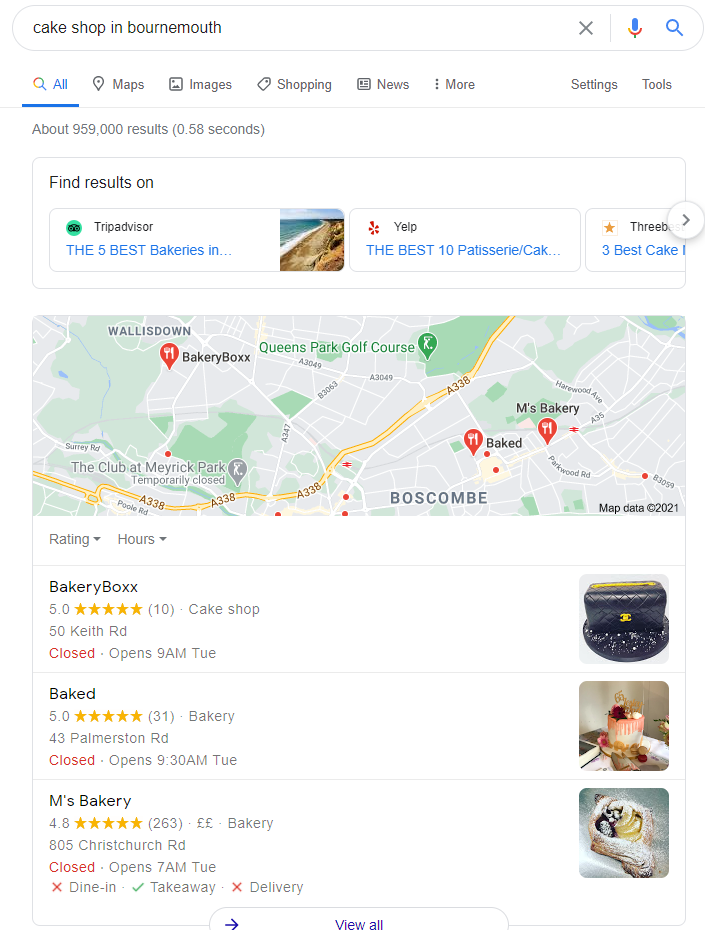The world of digital marketing is becoming increasingly competitive but local SEO helps you to outrank competitors in your area so that you can stay ahead of the game.
Local SEO involves optimising your online visibility on search engines such as Google in specific locations to gain more business from relevant local searches. By focusing on boosting your local SEO, you increase your chances of appearing at the very top of the search engine results page (SERP), so that when a user searches for something relevant to your business in your area, your company and its location will be visible to them - thereby improving the likelihood of them entering your website and making a purchase or enquiry.
Bing is another popular search engine people use; in the image below, you can see the local results provided when an online user searches for ‘cake shops in Bournemouth’.

If your aim was to compete with these businesses online, you may need to up your local SEO game to outrank them. This article will further detail how local SEO works, why it could be important for your business and how you can boost your online presence.
How local SEO works
Local SEO has slightly different ranking factors which determine where your website appears on the SERP. According to Google, local rankings are determined by relevance (how relevant the result is to the search), distance (how far the business is from the user) and prominence (how well known the business is). The important thing to remember here is that search engines such as Google have the users’ interests at heart, and so, they prioritise results which are most likely to meet the user’s needs. Local SEO ranking signals include:
- The location the user is searching from - for example, if you were to search ‘italian restaurant near me’ in both Birmingham and Bournemouth, you’d get different results. This is because search engines can get your location from your GPS or IP address...they’re smart like that.
- Online reviews, testimonials and Google Maps star rating
- The location of your business
- Backlinks to your webpage (other websites who link to you in their content)
- Inclusion of relevant keywords
- Citations that include a consistent name, address and phone number (NAP)
Plus many more!
There are also local business results known as 'The Local Pack', this is where several businesses and a map of their locations are pulled from Google Maps (along with their NAP details). Here’s an example in a Google search:

As you can see, Google has provided the user with three different cake shops in Bournemouth. Not only are these results relevant to the user’s search, they feature positive customer reviews, indicating that Google has prioritised them based on their reputation as well as locality. At this point, the user can easily click onto their websites, find out their exact location if they wish to visit the store or get in touch with them directly.
Why local SEO is important to your business
Local SEO is essential for helping local target audiences discover your business online. Here are some reasons why it’s important for your business:
- It can drive traffic to your site, helping to generate leads and increase your sales.
- You can attract users who are ready to buy - 76% of users searching via smartphone will actually visit a store within a day of their local search.
- People are actively searching for local businesses - 29% of people search for local businesses at least once a week.
- You make it easier for users to contact you - it’s unlikely that a user will find your business after scrolling through the SERPs, especially if they’re looking for a quick solution. Considering that studies have shown that the top organic search result has a click-through rate of 28.5%, it’s well worth investing time and effort into climbing the SERPs.
- It helps users to find you - studies have shown that a whopping 86% of users search for the location of a business on Google Maps.
How to boost local SEO
Many techniques can be applied to boost local SEO, here’s how you can climb the SERP:
Research, research research!
The first thing you need to do is conduct thorough keyword research (one of our favourite tools to use for this is Semrush). This will allow you to identify what users are searching and how they are searching for it; guesswork is unlikely to get you far when it comes to successful SEO, so take the time to find out what keywords your webpages should be targeting.
It’s important to also do some competitor research in order to understand what types of information and formatting Google is rewarding for the search terms you’re targeting. For example, if a user is looking for instructions to cook a curry online, a webpage which features a numbered list outlining the steps involved may rank higher than those that don’t because search engines may determine the bulleted formatting to be more useful.
Create killer content
Creating quality content should not be underestimated; copy which is difficult to read or riddled with links won’t impress Google, let alone your target audience.
Make sure that your content is relevant and includes your target keywords (without overdoing it - cramming in too many keywords is also known as ‘keyword stuffing’ and can harm your SEO efforts) to help signal its relevance to search engines such as Google. You can also include NAP information (name, address and phone number) as this is another contributing ranking factor for local SEO.
Optimise images, meta content and the URL
It’s not just the content you need to optimise for your target keywords, you need to look at your images, meta content and URL too. You may not have thought about optimising your images before, but by altering your image alt text you can:
- Display what the image is supposed to be if it takes time to load to give users and search engines context.
- Improve web accessibility, allowing visually impaired users to use screen readers to read the alt attribute to help them understand the image.
- Help search engines to index your images properly and provide clear descriptions.
- Include more target keywords!
By including target keywords in images, the URL and meta content, you’re telling search engines that your webpage is relevant to the search term, thus, improving the chances of ranking well on the SERP.
Add internal links
By adding internal links, you can spread link equity and help search engines to understand the structure of our site.
Add LocalBusiness schema markup
The LocalBusiness schema is additional code which communicates that you are a local business to search engines. By applying the LocalBusiness schema, you are able to include NAP information to tell search engines where your company is located (demonstrating its relevance to local searches) as well as details about what your business offers. You can even use a handy schema markup generator tool to do all the hard work for you!
Link build
Link building will help towards earning domain authority and indicates that your site is recommended to search engines. In terms of improving local SEO, you could try building links with relevant local businesses - for example, if you sell kitchenware, you could ask a local bakery to link to you on their website so that their customers know where to get the baking utensils they need.
You do need to be careful with link building though, not all links are good - in fact, some backlinks can actually damage your site. Essentially, you just need to do a little research into sites you’d like to link to you, look at:
- Whether they invite ‘guest writers’ or monetize content - Google actually issued a warning about sites which publish content for the purpose of building inbound links.
- Their own domain authority and how they rank
- Whether their site feels spammy - absolutely AVOID spammy sites at all costs!
- The relevance of their site - is it really connected to your content?
- Whether their site looks neglected - for example, if their last blog was posted a year ago, it’s clear that they don’t update their content regularly enough to be useful.
Of course there are many other important SEO ranking factors to consider, such as how mobile friendly your website is (as many users will be accessing your site via mobile phones and don’t want to see miniscule text or have trouble with navigation) but this article will hopefully have shed some light on local SEO and how it can benefit your business.
Looking to boost your local SEO efforts?
If you want to drive more local traffic to your website and increase sales, we can help! We are an SEO agency in Bournemouth with years of experience in helping local businesses (as well as businesses across the UK and globally) improve their online presence. Take a look at our SEO services here and get your brand the attention it deserves!




